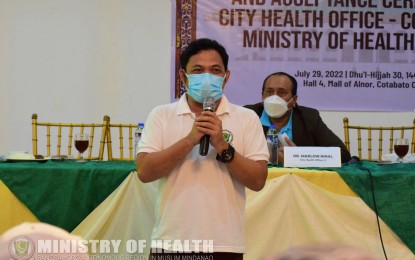
Nurse Ron Aray, the Ministry of Health-Bangsamoro Autonomous Region in Muslim Mindanao coordinator on dengue and head of the emerging and re-emerging infectious disease program. (Photo courtesy of MOH-BARMM)
COTABATO CITY – Health authorities in the Bangsamoro Autonomous Region in Muslim Mindanao (BARMM) have warned the public against deadly mosquito bites, as dengue cases rose by 624 from July 30 to August 13.
“To all Bangsamoro people, let us clean our surroundings, let us maintain cleanliness not only in our homes but also in our environment,” Ron Aray, the BARMM’s Ministry of Health (MOH) coordinator on dengue and head of the emerging and re-emerging infectious disease program, said Wednesday.
MOH-BARMM records indicated that dengue cases have reached 2,124 from January to August 13 and that 30 have succumbed to the mosquito-borne disease over the period, as compared to zero fatalities in the same period in 2021.
Data from the MOH-BARMM Regional Epidemiology and Surveillance Unit showed that Lanao del Sur had the highest number of cases with 1,035, followed by Cotabato City, with 425; Maguindanao, 393; Tawi-Tawi, 112; Sulu, 90; and Basilan, 69.
The majority of the dengue patients, numbering 1,145 or 54 percent, were children aged 10 years and below.
Aray urged the public to practice the 4S strategy against dengue, which refers to Searching and destroying mosquito breeding places; Self-protection; Seeking early consultation, and Supporting fogging or spraying operations in hotspot areas.
He said the symptoms of dengue include fever, headache and pain behind the eyes, muscle and joint pains, extreme fatigue, and rashes.
“If you have these symptoms, go and see your doctor,” Aray advised BARMM residents.
He said the MOH-BARMM has been providing anti-dengue supplies, such as insecticides, to the rural health units and city health offices in the region. (PNA)
